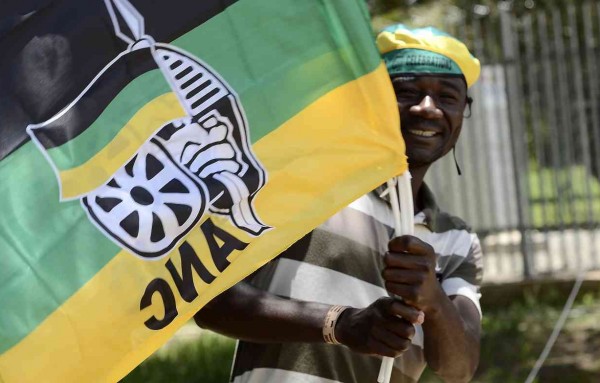Written for www.enca.com – 15 December 2017
http://www.enca.com/opinion/are-anc-delegates-listening-to-rumblings-beyond-conference-walls

File: The African National Congress is torn between delegate preferences that are balanced finely between two divergent candidates, and public opinion. Photo: AFP / Stephane de Sakutin
Moving into its 54th national elective conference the African National Congress (ANC)is torn between delegate preferences that are balanced finely between two divergent candidates, and public opinion that favours Cyril Ramaphosa over Nkosazana Dlamini-Zuma. The ANC’s problem is that public sentiment affects election results – and the ANC conference could deliver a presidential choice that could sabotage the ANC’s 2019 electoral prospects.
Up to the start of the conference the outcome of the leadership elections – of the president and the associated slate – remained too close to call. The two main presidential contenders – Ramaphosa (CR) and Dlamini-Zuma (NDZ) – were engaged in a seemingly intractable battle, one that reflected the divided, factional state of the ANC.
Interestingly, the evenness of the CR-NDZ race was far removed from the findings of multiple public opinion polls that preceded the conference. Without exception, these polls delivered strong endorsements of Cyril Ramaphosa as next ANC president, besides showing that CR was the candidate to help resuscitate ANC prospects for ongoing majority status in the 2019 national elections.
The public opinion polls, referred to in this review, shed light on the preferences of South African citizens and voters (including ANC voters) across South Africa’s provinces. They reveal variations on the central finding of the citizens’ desire to rid the ANC of Zuma and Zumaist influences. They deliver insights on leadership endorsements, and estimates of the damage that President Zuma has inflicted, through the eyes of South Africa’s ‘ordinary’ citizens.
The first set of polls deals with the substantial discrepancy between levels of ANC support (even the lowered ones of recent years) and endorsements of Zuma. The Kantar TNS tracking surveys demonstrate that Zuma’s support lags far behind the ANC’s: Zuma’s approval ratings were less than half of that of the ANC. On an ever-declining graph Zuma in August 2017 had an approval rating of a mere 18 percent.
The likely damage that Zuma bonds could cause electorally was evident even in internal ANC polling research of late 2016. In an interview with the author an ANC insider has revealed that should Zuma (or a Zuma associate) lead the ANC into an election, the ANC would lose its outright 50 percent national majority. This was corroborated by a nationwide Ipsos survey.
With this in mind, the extent to which candidates sever or affirm a link to Zuma became a crucial conference and election-related question. CR was adamant in his campaign that corruption and capture will end under his watch. He stressed restoration of values of service, selflessness and commitment to the people. On the down-side, he was complicit in the ANC’s silences on and defences of Zuma.
NDZ, in contrast, relished in her admonishment to all not to equate her with being Zuma’s ex-wife. Her status of being South Africa’s first female presidential candidate next served to veil the dense JZ-NDZ bond. She remained JZ’s continuous political associate: dependent on the exact constituency that protected JZ, tentative in pronouncing on the eradication of corruption and state capture and remained the only presidential candidate endorsed by JZ.
A second set of surveys focuses on details of the damage Zuma inflicted on the ANC, both in previous elections and to state institutions generally. The ANC suffered an 11 percent decline in Gauteng province in 2016; this caused the loss of metropolitan councils. The respondents in this survey had been questioned about significant Zuma-related political events in the run-up to the August 2016 elections. Everattwrites that President Zuma’s behaviour “had a direct and negative impact on the choices voters made”.
Zuma’s firing of former Finance Minister Nonhlanhla Nene in late 2015 made 41 percent re-think which party they would vote for; 54 percent recorded that the Constitutional Court ruling that Zuma had to pay back the public funds spent on security improvements at his Nkandla residence affected their vote; and 56 percent said the corruption charges against Zuma affected their voting decision.
The 2017 Institute for Justice and Reconciliation survey shows that South Africans’ trust in central government and the president were the lowest among state institutions. Both are core state institutions, in which Zuma played a central role. The findings reflected a longer-term trend that South African state institutions suffered widespread lapses in credibility in the time of Zuma.
A third set of 2017 surveys solicits opinions on preferred presidential candidates. A Citizen Surveys poll zoomed in on voters’ preferred future presidents. On the issue of who the next leader of the ANC should be, Ramaphosa was in first place, receiving a 43 percent endorsement, compared with second place Dlamini-Zuma’s 16 percent. Ramaphosa’s endorsements spanned the rural-urban divide: he received 48 percent of support among metropolitan Africans who intend to vote, and 45 percent among rural respondents. Dlamini-Zuma received 20 percent in metropolitan and 21 percent in rural areas. Ramaphosa was the favourite in every province except KwaZulu-Natal, scoring 67 percent in Limpopo, and around 50 percent in the Free State, Eastern Cape, North West, and Gauteng.
Overwhelming support for Ramaphosa as president also emerged in the MarkData public opinion poll (September- November 2017) done for eNCA and as reviewed in an eNCA broadcast of 14 December. In September 2017 Ramaphosa was endorsed by 48 percent of respondents in the national survey, and Dlamini-Zuma by 21 percent. They were the two leading candidates and Ramaphosa dominated by a similar margin when it came to age and language groups, income and employment categories, and across educational statuses. This survey showed that Ramaphosa was by far the preferred presidential candidate and that he would have a strong unifying effect on South African society.
These findings were comparable to the Ipsos research that found that only 18 percent of South African adults wanted Zuma to remain the country’s president and that his approval rating had fallen to 2.8 out of ten compared with the 6.7 and 8.7 for presidential predecessors Thabo Mbeki and Nelson Mandela respectively.
Finally, a social media survey of late 2017, Ratepop, confirmed the that “the chances of the ANC maintaining its parliamentary majority with Nkosazana Dlamini-Zuma at the helm of the party [are] realistically unlikely at this point”. The poll suggested that should Ramaphosa be victorious significant numbers of EFF and DA supporters would desert their parties and vote for the ANC in 2019. Dlamini-Zuma would not be a drawcard at all.
Hence, will the ANC branches and delegates deliver evidence that they have been listening to these rumblings beyond the conference walls? Will they be acting in the longer-term electoral interests of the ANC, or will they make their leadership decisions irrespective of what is transpiring in the hearts and minds of South African voters and citizens?
Susan Booysen is a professor at the Wits School of Governance. She is a political scientist and policy analyst, and author of Dominance and Decline: The ANC in the Time of Zuma (2015) and The ANC and the Regeneration of Political Power (2011)
eNCA

